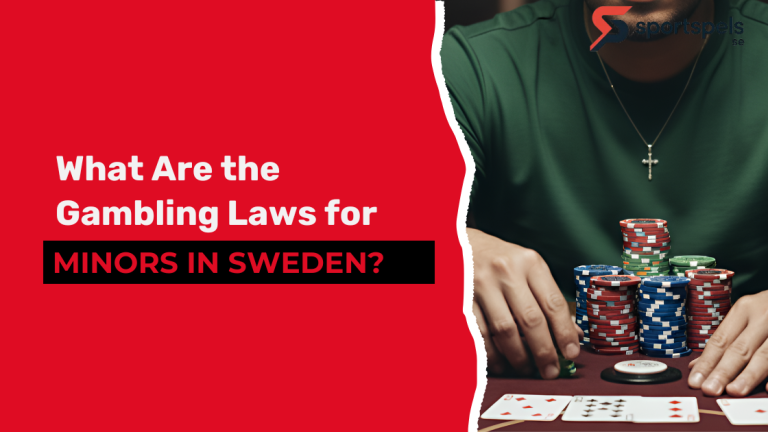Sweden has one of the strictest gambling systems in Europe, especially when it comes to protecting minors. The country’s rules focus on safety, transparency, and preventing under-18 individuals from accessing gambling in any form.
Instead of treating gambling like entertainment for all ages, Sweden sets clear boundaries to ensure young people stay away from risky behaviour. This article explains the exact laws that apply to minors, how operators must follow them, and what penalties exist for breaking these rules.
Key Takeaways
- Sweden sets the legal gambling age at 18 years, while land-based casinos require 20 years.
- Gambling is regulated by the Swedish Gambling Authority, which strictly protects minors.
- Betting on events where the majority of participants are under 18 is completely prohibited.
- Operators must use strong age verification and cannot market to minors.
- Violations can lead to heavy fines or loss of licence.
Overview of Sweden’s Gambling Regulatory Framework

Sweden’s gambling system focuses on consumer protection and responsible betting. The Swedish Gambling Act outlines how operators can provide services while ensuring minors stay fully protected. This framework includes strict rules on age limits, marketing, verification, and game-offering policies.
The Swedish Gambling Authority oversees how operators behave, investigates violations, and ensures that minors are never allowed to enter gambling environments. Sweden’s regulations are known for being firm, detailed, and designed to minimise risk for vulnerable groups.
What Are the Gambling Laws for Minors in Sweden?

Sweden has strict rules designed to protect anyone under eighteen from all forms of gambling, both online and offline. These laws focus on age limits, advertising restrictions, and safety measures that prevent minors from accessing or being exposed to gambling activities.
Minimum Age Requirement for Gambling
Sweden defines eighteen as the legal age for participating in all licensed gambling activities. This rule covers online betting, lotteries, sports wagering, bingo, and digital casino games.
The purpose is to protect young individuals from developing early addictive patterns or facing financial risks they cannot manage responsibly.
Operators must confirm every player’s age before allowing them to play. If someone under eighteen attempts to register or access games, the operator is legally required to block the attempt and report suspicious cases.
Minimum Age Requirement for Entering Land-Based Casinos
Sweden sets a separate rule for physical casinos, where the minimum age for entry is twenty. This higher limit recognises the intensity of the casino environment, where fast-paced games and larger wagers require more maturity and understanding.
Casinos must check every visitor’s official ID at the entrance. Even a single mistake in ID handling can result in penalties for the establishment, as minors must not be exposed to casino environments.
Ban on Betting on Events with Under-18 Participants
Sweden prohibits betting on any match, tournament, or event where the majority of participants are younger than eighteen. This law protects youth players from external pressures and prevents match manipulation in junior sports.
Operators must assess the age composition of participants before offering any betting market. If minors make up most of the group, the operator cannot publish or accept bets on that event.
Ban on Marketing and Advertising Targeted at Minors
Gambling promotions in Sweden must never be designed or placed in a way that attracts underage individuals. Ads cannot appear on children’s websites, youth-focused social media pages, or environments where under-eighteen users are the primary audience.
In addition, advertising content must look clearly adult-oriented. If visuals, language, or placement seem appealing to minors, the operator may face regulatory warnings or fines.
Mandatory Age Verification for All Players
Every licensed gambling operator in Sweden must verify the identity and age of a user before allowing participation. This verification usually happens through BankID or official identification documents.
Operators cannot delay verification or allow gameplay while documents are pending. The entire process must be completed before deposits, withdrawals, ls, or wagers are allowed. This ensures minors cannot slip into the system.
Restrictions on Gambling Exposure in Youth Areas
Sweden prevents gambling elements from appearing in youth-centered spaces. This means gaming machines, gambling posters, or digital displays cannot be placed near schools, children’s entertainment centres, or youth clubs.
These environmental restrictions help reduce early exposure, keeping minors from being influenced by gambling visuals during their daily routines.
Penalties for Allowing Minors to Gamble
The Swedish Gambling Authority imposes strict consequences on operators who fail to protect minors. Penalties can include large fines, legal warnings, or complete loss of licence, depending on how serious the violation is.
These actions ensure that operators treat minor protection as a priority. Strong enforcement also maintains trust in Sweden’s regulated gambling environment, creating a safer system for all players.
Why These Laws Matter for Sweden’s Gambling Safety?

Sweden’s gambling restrictions for minors are not just legal boundaries. They are long-term safety measures designed to reduce harm before it begins. By regulating access, advertising, verification, and betting markets, the country ensures that young people remain protected during their most sensitive years.
These laws also create a stronger and more trustworthy gambling environment for adults. When minors are shielded from risky exposure, the entire system becomes more responsible, transparent, and fair for everyone who participates legally.
Key Points Behind the Importance of These Laws:
- They prevent early exposure to gambling behaviour that may lead to long-term addiction.
- They ensure that gambling remains an adult activity with clear age-based control.
- They reduce risks around youth sports manipulation and unfair betting markets.
- They strengthen the credibility of licensed operators within Sweden’s regulated system.
- They build a safer online environment where minors are strictly restricted from harmful content.
Conclusion
Sweden’s approach to gambling laws for minors focuses on creating a safe, responsible, and well-regulated environment where young people remain fully protected. By enforcing strict age limits, monitoring youth-related events, and placing firm controls on advertising, the country keeps gambling away from vulnerable audiences.
For operators, these rules act as a roadmap for ethical conduct, and for families, they offer reassurance that minors cannot easily access betting platforms. In the end, Sweden’s strict framework reflects a larger goal: making gambling a controlled activity for adults while ensuring every young person grows up without unnecessary risks.
FAQs
The legal age for all licensed gambling activities is eighteen, ensuring that minors cannot access online or offline betting environments. For land-based casinos, the minimum age is twenty, which provides an extra layer of protection in high-risk gaming settings.
They might technically reach such websites, but doing so is illegal and exposes them to unregulated, unsafe conditions. These platforms lack age checks and consumer protection, which increases risks for young users.
No, Sweden completely bans betting on events where the majority of participants are under eighteen. This rule prevents external pressure, protects young athletes, and reduces the chances of match manipulation in junior sports.
Physical casinos offer high-intensity games, fast betting cycles, and immersive environments that demand higher emotional maturity. The age limit of twenty ensures that only adults with better decision-making capacity enter these spaces.
Operators can face heavy fines, legal warnings, or even the permanent loss of their licence. These penalties are designed to enforce strict responsibility and prevent any operator from ignoring minor protection rules.


